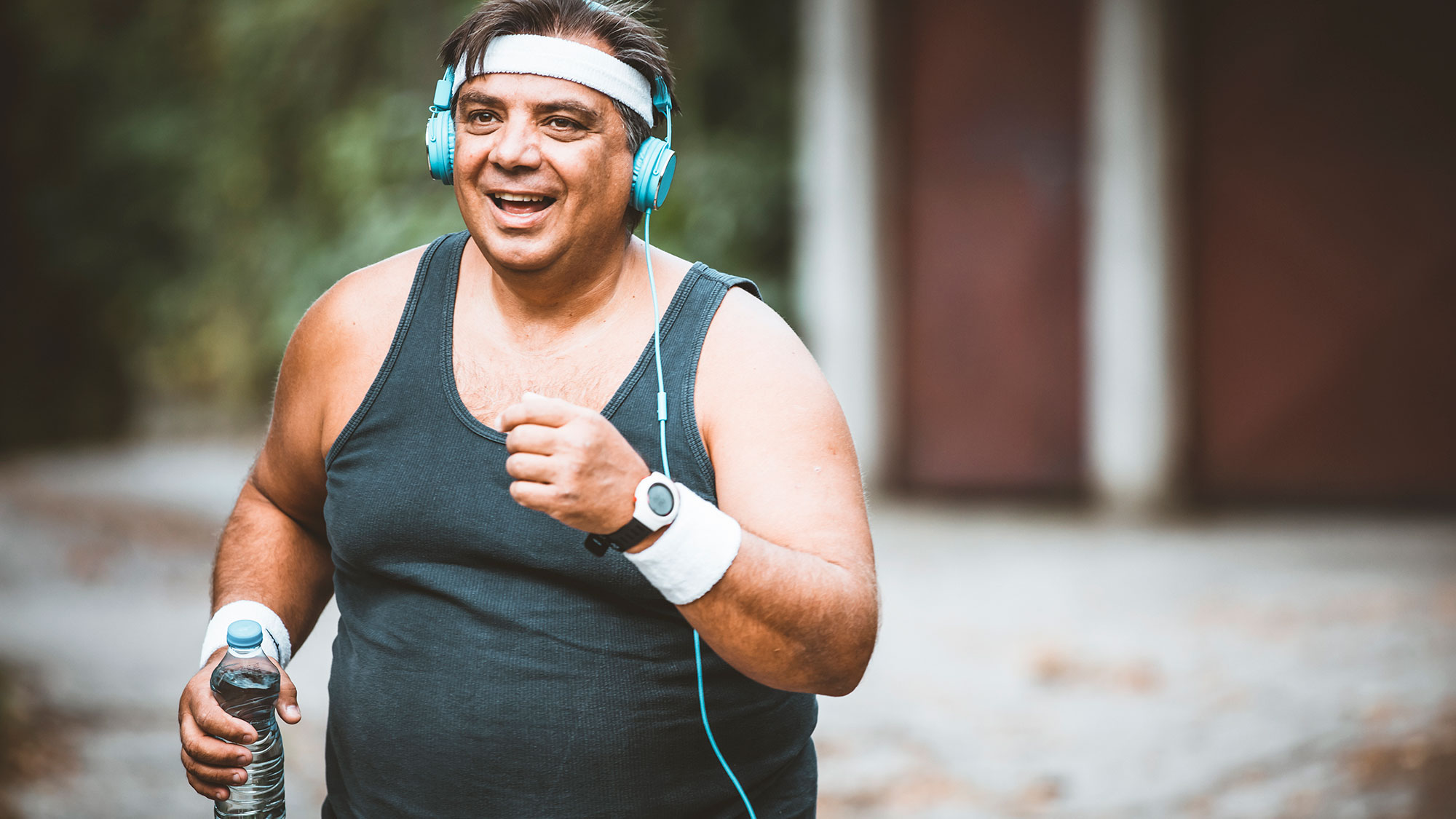11 questions to ask if you’re struggling to lose weight
If you’re trying - and failing - to lose weight, these common issues could be the cause


It’s a common problem: you start a new exercise routine or diet plan expecting to lose weight quickly - but frustratingly, weeks later you just don’t seem to be getting anywhere.
Alternatively, perhaps your weight loss journey started off successfully enough, but now the results just aren’t the same and you can’t figure out why. So what’s going on?
The answer could lie in one of any number of areas. Even the best exercises for weight loss or a balanced diet often isn't enough on its own, so try asking yourself the following questions to get to the bottom the reasons behind your weight loss struggles - and discover how to develop healthy practices to help you achieve your goals.
Am I eating enough protein?
Protein plays a pivotal role when it comes to weight loss.
Claire Barnes, nutritional therapist at Bio-Kult explains: “Consuming a good quality protein source with each meal or snack should help to sustain fullness for longer.”
This is especially important at breakfast, she says, so put eggs on the menu or add a scoop of one of protein powder to your morning smoothie (see our pick of the best protein powders for weight loss).
Choosing proteins which also contain Omega-3 fats can also be beneficial, says Claire. “They not only increase satiety, but also reduce inflammation in the body and burn stored body fat; oily fish (such as mackerel, sardines and salmon), flaxseeds and walnuts are all good choices.”
Start your week with achievable workout ideas, health tips and wellbeing advice in your inbox.
Am I getting enough sleep?
Katie Anderson, Head of Training at FLY LDN explains the importance of clocking up eight hours of sleep each night.
“Our bodies are wonderful machines that function best when we provide it with fuel, water and rest. When we sleep at night, our body keeps on working and uses our rest time to repair and replenish so we are ready for the next day.
"If we are well rested, we are also less likely to crave caffeine and foods high in sugar to help us get through the day, and we feel more energized and ready to exercise.”
Am I moving enough?
Current government guidelines advise that all adults should do at least 150 minutes of moderate intensity activity every week as a minimum. This will keep us healthy and mobile, however - as Anderson points out - it may not necessarily result in weight loss.
“In order to lose weight, we have to pay attention to the type of movement, the length and the quantity,” she says.
At its most basic, weight loss results from a calorie deficit - i.e. the body using more calories than it consumes. So the key is to find ways to burn more calories in your daily routine.
For example, if you’re walking to lose weight, plan a route that includes hills and stair-climbs to ensure you lift your heart rate into the calorie-burning cardio zone. Or, if you enjoy exercise classes, find one that incorporates weights, as strength training is proven to burn more calories.
“The key is to find out what you enjoy, but make it challenging!” says Anderson.

Am I drinking enough water?
“We should aim to drink 1-2 liters of water a day,” says Anderson - although you probably already knew that. But did you know how hitting your daily water quota can aid weight loss?
Anderson explains: “The benefits include feeling fuller in between meals and more energised, as well as having reduced risk of muscles cramping during exercise, meaning you can work out to your fullest potential.”
If you find drinking water boring, get creative by adding slices of fresh fruit and vegetables, like cucumber and mint, orange and lemon, or strawberries, to give your water a natural shot of flavor. And take a look at our pick of the best gym water bottles to stay hydrated whilst you workout.
Am I mixing up my workouts?
Slogging it out on the treadmill five times a week and still not seeing results? You need to add some strength training into the mix.
As Lyndsey Forfar, Head Trainer at F45 Vauxhall explains, “A common misconception is that you have to do a lot of cardio to lose weight, but you also need some resistance exercises too.”
Why? “As you gain muscle, your body burns more kilojoules when at rest so resistance training is extremely important for weight loss. “
Forfar suggests adding in at least two strength sessions a week and seeing if that makes a difference. She adds: “If you are new to this type of training you can start with bodyweight exercises such as push ups, squats, lunges and sit ups, before adding extra weight.”
Am I overly stressed?
Stress isn’t just bad news for our mental health - it can also have an impact on our waistline.
“Chronic or poorly managed stress can cause weight gain,” reveals Forfar. “It causes our cortisol levels to rise, which increases our appetite.”
What’s more, any stress-related weight gain is likely to end up in one particular area: the stomach. “Research has shown that increased cortisol levels tend to make us gain weight around our abdominal area,” Forfar says.
This makes stress management critical in weight loss regimes. Try and incorporate mindfulness practices into your daily routine, or schedule some yoga sessions. New to the practice? Check out our pick of the best yoga mats to help you get started.
Am I measuring the right weight loss stats?
When it comes to weight loss, even the best bathroom scales only tell half the story.
“Scales do not account for how much water or lean body mass that has been lost,” Barnes explains, adding that any weight-loss plan should focus on losing fat not pounds. The best way to track this progress is to measure your waist-to-hip ratio using a measuring tape.
Am I looking at calories in the wrong way?
When it comes to how to eat healthily, it’s important to remember that not all calories are created equal.
Clarissa Lenherr, a nutritionist at Bioniq, explains: “The calories in an avocado might be the same as a portion of fries, but the impact and nutritional intake of these two foods are definitely not the same.
“Calorie counting is a popular way of losing weight, which may work for some individuals, but there is a significant difference between a low-calorie diet of plant foods versus a diet filled with refined carbohydrates and sugars.
“Eating a meal full of wholegrains, fruits and vegetables, some good fats and protein is the best way to get a balanced intake of nutrients and calories and will help keep you full and satisfied for longer.” Check out our portion size guide for more info on eating a balanced diet.
Am I depriving my body through fad diets?
If you’re eliminating certain types of food from your diet, it could be doing more harm than good.
Lenherr says: “Whilst you have most likely heard of gluten-free or dairy-free, many popular diets are now also calling for people to be nightshade-free, sugar-free, lectin-free or grain-free – to name but a few!”
There are a number of problems with eliminating whole food groups unnecessarily, especially without the support of a nutritionist.
“Cutting out certain food groups can make you more at risk of nutritional deficiencies, reduced protein intake, inadequate fibre intake and low-calorie intake,” Lenherr warns.
“On top of this, a reductionist way of eating can leave people feeling unmotivated and bored, which increases the likelihood of unhealthy cravings and giving up on the diet altogether.”
Could I be nutrient deficient?
“Low levels of certain nutrients such as B12, magnesium and vitamin D can affect our weight loss goals,” Lenherr reveals.
“All of these nutrients are required to produce energy in the body. When we are low in energy, we are more likely to crave fast-acting, energy-rich foods such as refined carbohydrates and sugars.
“These foods tend to be higher in calories, lower in nutrients and extremely palatable – which can leave us reaching for more than one portion.”
Have I established a healthy routine?
For Barnes, routine is everything. “Stick to a regular routine of going to bed at the same time each night, waking at the same time each morning and eating meals at regular times during the day,” she explains. “This will enable your body to regulate metabolism, hunger hormones and mood fluctuations.”
Kirsty is an accomplished journalist specialising in the wellness industry. She has previously written for titles including Grazia, Popsugar, Metro.co.uk, Elle UK and the Sunday Telegraph. You’ll find her running around Windsor Great Park at 6am most mornings (before her toddler, Clementine Lilac, wakes up), followed by a virtual barre class with the team at Psycle London – where that barre burn is just so addictive. Kirsty loves to stock up on new activewear; because, let’s face it, you can never have too many pairs of sculpting leggings. She's always keen to try/endure the latest workouts to come to London. Kirsty also enjoys rustling up nutritious family meals and indulging in her newfound hobby: flower pressing.
